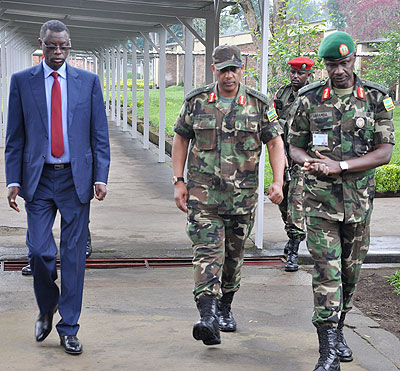Rwanda Defence Forces are committed to using various platforms to tell the country’s success story other than international organisations and some foreign media who deliberately distort facts on the country.


Rwanda Defence Forces are committed to using various platforms to tell the country’s success story other than international organisations and some foreign media who deliberately distort facts on the country.
Brig. Gen. Joseph Nzabamwita, the Defence and Military spokesperson, said this on Friday at the conclusion of the annual National Security Symposium at Rwanda Defence Force Command and Staff College in Musanze District.
The symposium brought together students of senior command and staff course second intake, public officials and experts from various sectors.
It aimed at addressing security challenges and complement the knowledge acquired by students over the one-year course.
Various presentations on security challenges in the region, Africa and the influence of international governance institutions, security and stability in Great Lakes Region, wars in Africa, organised violence and conflict management were among the topics discussed.
After the symposium, Gen. Nzabamwita said it was noted that despite what RDF has done, including stopping 1994 Genocide against the Tutsi, restoring security and continued participation in the development of the country, various reports by international bodies continue to ignore what we have achieved and instead opt to tarnish the image of RDF.
"We are going to have our voices heard, and we are going to do this as Rwanda Defence Forces, through other government institutions. We are going to use our academic institutions, our universities conduct research and publish findings and these findings should gradually overcome the negative publications against Rwanda,” said Gen. Nzabamwita.
Continuous telling
The Defence spokesperson said they would not dwell on reacting to the negative stories, but tell own stories and the constructive projects they are involved in.
"RDF stopped the Genocide in 1994 when international community abandoned us, but you will never see an article where they refer to the tragedy that happened in Rwanda giving credit to RDF, they are rather going to obfuscate it and hide it somewhere as if the Genocide was an accident and was stopped accidently,” Nzabamwita said.
Andrew Mwenda, a media commentator and proprietor of The Independent, said RDF has done a lot but still needs to make them known through wide and constant publications and broadcasts.
"If RPF wants to win the appreciation of the world, it must be able to broadcast the great things it is doing to the world, RDF needs to avoid being caught up in reacting to negative stories about it by international journalists, avoid that as much as possible, focus on telling your positive story,” Mwenda said.
He called on the RDF to establish a communications infrastructure that does not tell the success story once or occasionaly but rather continuously.


